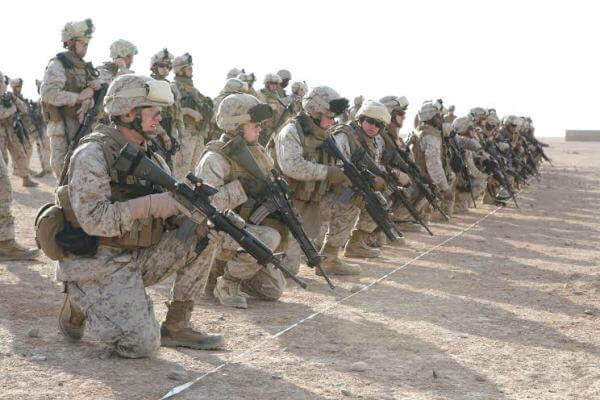All 184,000 Marines across the Corps will take a 24-hour pause from normal work activities within the next month as the service cracks down on needless death and injury and incidents of misbehavior within the force.
Marine Corps Commandant Gen. Robert Neller announced the one-day operational pause Nov. 8, telling all unit commanders and enlisted leaders in a message that "training accidents and destructive behavior by a small number of Marines" were indicators that the force needed to improve, Neller's spokesman, Lt. Col. Eric Dent, told Military.com.
In fiscal 2016, which ended Sept. 30, there were 80 on and off-duty Marine Corps fatalities, according to the Naval Safety Center.
These figures include on-duty work accidents and aviation mishaps as well as off-duty car, motorcycle, and recreational fatalities. They do not include combat deaths, suicides and other categories. Stars and Stripes, which first wrote about the operational pause, reported that there had been 152 Marine Corps deaths in total during the fiscal year, and 53 had been self-inflicted.
The one-day pause is for professional development and discussion, Dent said.
"We are losing too many Marines to avoidable death and injury," Neller said in a message to Marines Tuesday. "We have a culture of combat excellence, but we have to guard against complacency and a lack of focus at home station."
He added, "When we lose a Marine, you are the ones who feel it most -- they are your friends; they are your roommates in the barracks; you know their parents and loved ones. I need your help. The strength of our Corps is in our small unit leaders."
While on-duty and off-duty fatalities are down in all categories from fiscal 2015, there have been several high-profile incidents in the last year that may give cause for concern among Marine Corps leadership.
In Okinawa last month, officials with III Marine Expeditionary Force put a temporary ban on all water-related activities after three Marines and a Navy corpsman drowned in separate recreational incidents within 30 days.
The Marines' East Coast boot camp at Parris Island, South Carolina, was also rocked this year by the suicide death of 20-year-old recruit Raheel Siddiqui, a tragedy found to be caused by hazing that pervaded the culture of his recruit training battalion.
In the last two weeks, another recruit has been hospitalized in critical condition after an apparent suicide attempt, and another, 18-year-old Zachary Boland, was pronounced dead after being discovered unconscious in his bed. Boland's death has yet to be explained.
Dent said Neller's directive did not concern matters that remain under investigation or within the legal process, as all the Parris Island incidents do, but added that the commandant is concerned about the existence of hazing within the Marine Corps.
Marine Corps aviation has also come under scrutiny this year, beginning in January with a horrific collision of two CH-53E Super Stallion helicopters during a night flight off the coast of Oahu that resulted in the deaths of all 12 Marines aboard.
An investigation released in late October found that the cause of the crash was human error, driven by a lack of pilot flight hours as a result of limited available aircraft. The Marine Corps suffered two other aviation fatalities in fiscal 2016, both as a result of individual F/A-18 Hornet crashes.
The operational pauses will be observed by individual active-duty commands by Dec. 1, Dent said. Reserve units have until Feb. 13, 2017, to conduct the professional development days.
"This is our chance as professionals, from Private to General, to pause, think, reflect, and discuss who we are and how we can improve, both as individuals and as a team," Neller said in his message to Marine leaders.
"My goal is for Marines to understand their value to the organization, to know they have a voice, and for leaders to join them in the trenches to ensure we are focused on success," he said.
-- Hope Hodge Seck can be reached at hope.seck@military.com. Follow her on Twitter at @HopeSeck.


























